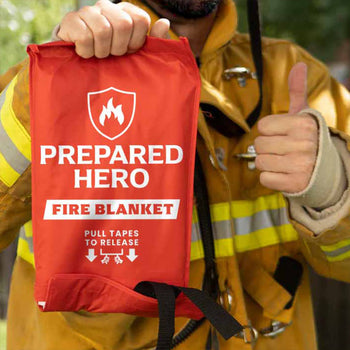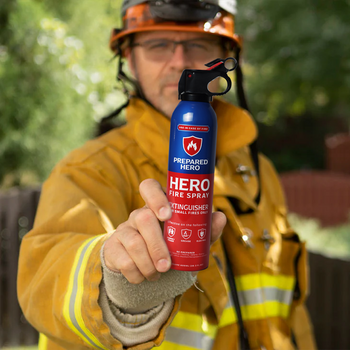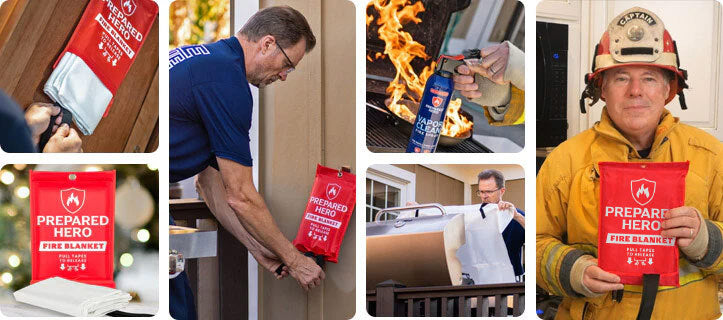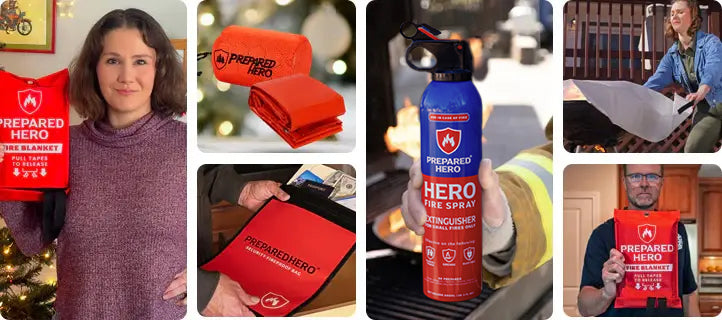Where you put your smoke detectors matters just as much as installing them. Proper placement makes sure they can detect...
Olive oil is a kitchen staple, but there’s more to it than just taste and health benefits. If you cook with it often, you should know how it behaves around heat. In this guide, we’ll talk about what olive oil is, how it’s made, the different types, and most importantly, whether it’s flammable or not.
You’ll also learn how olive oil can catch fire, what temperatures to watch for, and how to stay safe while using it. Whether you’re baking, frying, or just drizzling, this guide will help you cook smarter and avoid kitchen mishaps.
What Is Olive Oil?

Olive oil is a liquid fat made from olives. It’s mostly used in cooking, but people also use it for its health benefits. It contains healthy fats that may help lower cholesterol and reduce inflammation. The oil comes from the fruit of the olive tree and is made by crushing and pressing the olives.
First, olives are picked from the tree. The best oils come from carefully hand-picked olives. If the olives fall and hit the ground, they can bruise, which leads to lower-quality oil. After harvesting, the olives are cleaned and then crushed into a paste. Water is added and stirred to help release the oil. Finally, the mix is spun in a centrifuge to separate the oil from water and solids.
However, not all olive oil is the same. Here are the main types you’ll see in stores:
Extra Virgin Olive Oil
This is the highest-quality olive oil. It’s made with no heat or chemicals and must pass strict taste and chemical tests. The acidity must be under 0.8%. It has a strong, fresh olive flavor and is best used raw or in salad dressings.
Virgin Olive Oil
Virgin olive oil is natural and unrefined, but not quite as extra virgin. It has a slightly higher acidity of up to 2%. The taste is milder, which is great for light cooking.
Refined Olive Oil
This type comes from virgin olive oil that didn’t meet quality standards. It’s refined to remove flaws like bad taste or odor. The acidity is low (under 0.3%), but it has little flavor. It’s often used for high-heat cooking.
Regular Olive Oil
This is a blend of refined olive oil and a small amount of virgin olive oil to add flavor. It has a lighter taste and is great for frying, sautéing, and general cooking.
Is Olive Oil Flammable?

Contrary to popular belief, olive oil isn’t flammable. It’s combustible. Olive oil isn’t considered flammable because of its high flash point. The flash point is the temperature at which a liquid gives off enough vapor to catch fire. According to the Occupational Safety and Health Administration (OSHA), anything with a flash point below 100°F (or 37.8°C) is flammable. Olive oil has a flash point around 410°F, so it doesn’t meet that standard.
But that doesn’t mean it’s completely safe around heat. Olive oil is combustible, which means it can catch fire. It just needs higher heat to do so. If it gets too hot, like when left unattended on the stove, it can ignite. This is why grease fires can start in the kitchen even though the oil itself isn’t labeled flammable.
Plus, olive oil can self-ignite if it’s soaked into a rag and left exposed to air. It’s rare but possible. Once the oil breaks down, it can release harmful fumes like acrolein, which can irritate your lungs.
While olive oil won’t burst into flames easily, it can still cause a fire under the right conditions. Always watch it while cooking, and don’t overheat it. Just because it’s not flammable doesn’t mean it’s fireproof.
Can Olive Oil Cause Fires?
Yes, olive oil can cause fires, especially if you’re not paying attention while cooking. While it's not flammable like gasoline, it’s still combustible. That means if it gets hot enough, it can catch fire.
Here’s how it happens: olive oil has a smoke point of around 410°F. Once it hits that temperature, it starts smoking and releases vapors. If those vapors come into contact with a flame, a hot burner, or even a spark, they can ignite. This is especially risky when frying or using high heat.
According to the U.S. Fire Administration and the National Fire Protection Association (NFPA), cooking fires are the leading cause of home fires. Cooking fat, including olive oil, plays a big role in that. Many fires start when someone walks away from the stove or pours oil too close to a hot burner.
Another risk? Spontaneous combustion. If oil-soaked rags are left in the open air and start to oxidize, they can ignite on their own. It’s rare, but it happens.
How to Prevent Olive Oil Fires
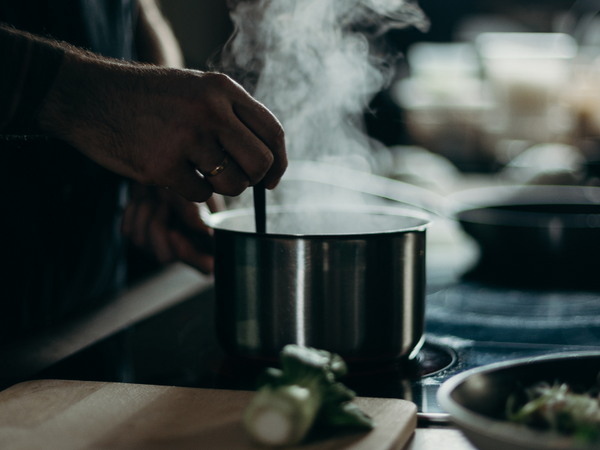
Cooking with olive oil is common in many kitchens, but it can be risky if you’re not careful. Olive oil can catch fire when overheated, leading to dangerous grease fires. The good news? You can prevent it with some simple habits.
1. Stay in the Kitchen
Never walk away from the stove when using vegetable oil. Even a few minutes can be risky. If you need to leave, turn off the heat or ask someone to watch it for you. Remember, unattended cooking is the top cause of kitchen fires.
2. Know Olive Oil’s Smoke Point
Olive oil starts to smoke at around 410°F. That’s when vapors are released. Use a kitchen thermometer to keep an eye on the temperature. Don’t just crank up the heat and hope for the best.
3. Heat It Slowly
Start with low or medium heat. Heating oil too quickly can push it past the smoke point in seconds. If it starts smoking, turn off the heat right away. Be patient because it’s safer and helps the oil last longer.
4. Keep Water and Frozen Foods Away
Never put wet or frozen food into hot oil. It causes splattering and steam, which can make the oil pop or even ignite. Always pat food dry and thaw it before frying.
5. Don’t Reuse Oil Too Much
Old oil breaks down and becomes unstable. After using it a couple of times, it’s best to toss it. Fresh oil is safer and cooks better.
6. Keep the Cooking Area Clean
Wipe off grease from stoves, walls, and pans. Built-up grease can ignite. You should also keep paper towels, napkins, and packaging far from the stove. A clutter-free kitchen is a safer kitchen.
7. Be Ready for Emergencies
Always have a fire blanket, fire spray, or Class K fire extinguisher nearby. Learn how to use them before you actually need them. Quick action can stop a small fire from becoming a disaster.
How to Put Out Olive Oil Fires

Olive oil can catch fire if overheated. Knowing what to do can save your kitchen and keep you safe. Here’s how to put out an olive oil fire fast:
1. Turn Off the Heat
If your olive oil catches fire, don’t panic. First, turn off the burner without moving the pan. Doing it might cause the burning oil to spill and spread the fire.
2. Use a Fire Blanket or Spray
Grab a fire spray or a Class K fire extinguisher. Fire sprays are easier to use, safer around kids and pets, and way less messy than extinguishers. Only use a Class K extinguisher on a grease fire if you’re trained and confident. If the fire is on the stove, throw a fire blanket over it. It’ll cut off oxygen and smother the flames fast.
3. Skip the Water
Never pour water on a grease or Class K fire. It won’t help. It’ll only make things worse by splashing the burning oil and spreading the flames. Just don’t do it.
4. Get Out
If nothing works, get out and call 911. Fires spread fast, and your safety comes first. Don’t try to be a hero if it’s out of control.
Can I Use Olive Oil in a 450-Degree Oven?

You can use olive oil in a 450-degree oven, but it depends on the type. Light olive oil is okay at that temperature because it has a higher smoke point (over 450°F). Extra virgin olive oil, though, isn’t a good choice. Its smoke point is only around 320°F, so it could burn and leave a bitter taste or even start smoking.
A rule of thumb: the lighter the color of the oil, the higher the heat it can handle. Stick with light olive oil or use something more heat-resistant like coconut oil for high-heat cooking, like roasting or baking at 450°F. Save extra virgin for drizzling or low-heat recipes where you want that rich, fresh flavor to stand out.
At What Point Does Olive Oil Ignite?
Olive oil can catch fire if it gets too hot. The exact temperature depends on the type. Regular refined olive oil ignites between 390°F and 470°F. Virgin olive oil starts burning around 410°F. On the other hand, high-quality extra virgin olive oil can handle about 405°F. However, the more common extra virgin kind can ignite at just 374°F.
So, you’re risking a fire if you're using olive oil and your pan or oven gets too hot. That’s why it’s important to watch your heat and never leave hot oil unattended. Once it starts smoking, turn off the heat because it’s getting close to the danger zone.
Conclusion
Olive oil is great for cooking, but it comes with some fire risks. It’s not flammable, but it is combustible, which means it can catch fire if it gets too hot. Always keep an eye on the stove, don’t overheat the oil, and never toss water on a grease fire.
Do you want reliable, easy-to-use, and affordable tools to put out grease fires before they spread? Check out Prepared Hero’s fire prevention tools here, and get up to 51% off on certain items. Stay prepared, hero!


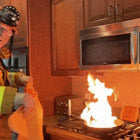 Fire
Fire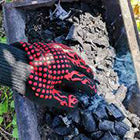 Safety
Safety Survival
Survival Protection
Protection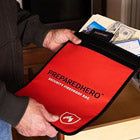 New
New
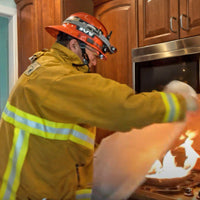 Fire
Fire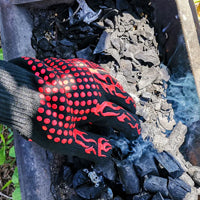 Safety
Safety Survival
Survival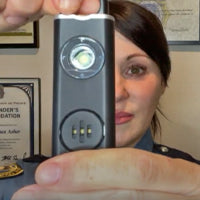 Protection
Protection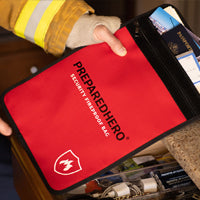 New
New
